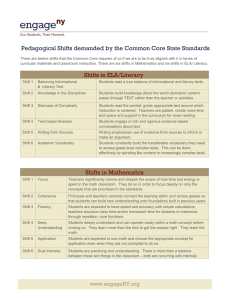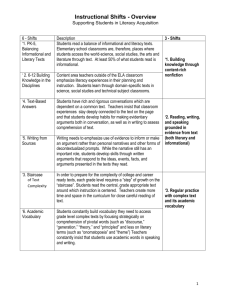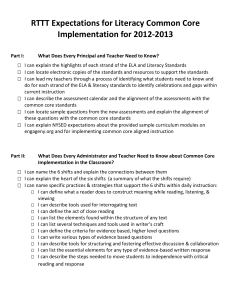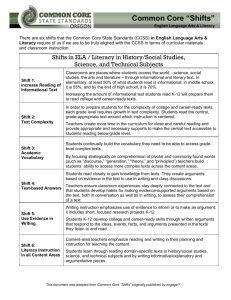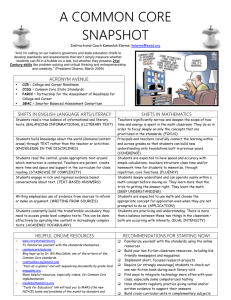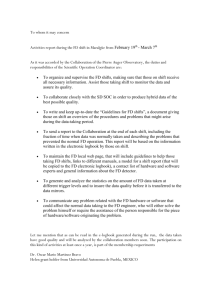The New Illinois Learning Standards
advertisement
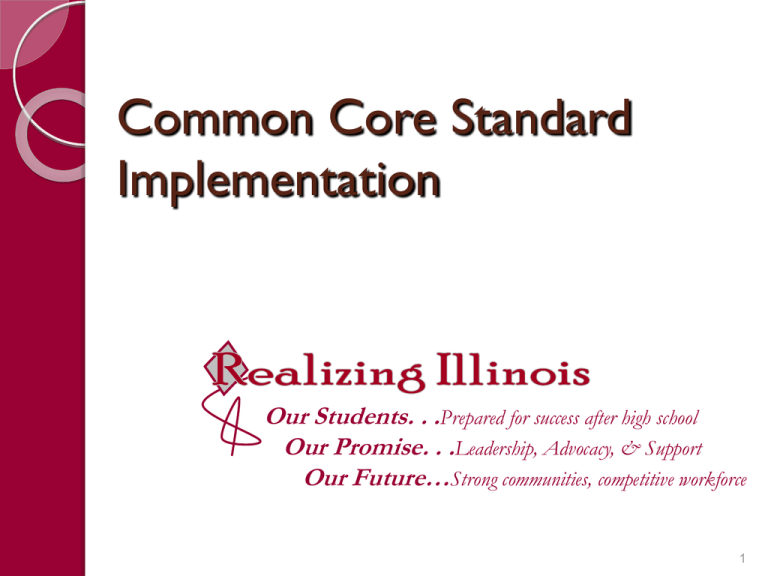
Common Core Standard Implementation Our Students. . .Prepared for success after high school Our Promise. . .Leadership, Advocacy, & Support Our Future…Strong communities, competitive workforce 1 Illinois Learning Standards • The Illinois State Board of Education adopted new Math and ELA standards for K12 education aligned to college and career readiness. • Currently they are drafting the Science Common Core Standards Illinois State Board of Education 2 Why are a Common Set of Standards Important? Preparation: These standards are designed for students to be college and career ready upon completing secondary education. Quality: Teachers are given more flexibility to teach standards in depth and across disciplines that can be tailored to fit the students needs. Skilled Workforce: These standards emphasize skills and application, in addition to content, to prepare students for working in the current workforce. 3 Why are a Common Set of Standards Important? Clarity: The standards are designed to help teachers, students, and parents understand what is expected of them to be ready to enter the workforce or college. Consistency: These standards will level the playing field so all students will be held to the same rigorous expectations. Global Society: The standards are internationally benchmarked to high performing countries to help our students succeed in a global economy. 4 What does College and Career Ready Mean? The College and Career Ready descriptions are not standards themselves but instead offer a portrait of students who meet the new standards. 5 What are College and Career Readiness Skills? • They demonstrate independence • They build strong content knowledge • They respond to varying demands of audience, task, purpose discipline • They comprehend as well as critique. • They value evidence • They use technology and digital media strategically and capably • They come to understand other perspectives and cultures 6 Instructional Shifts for the Common Core Instructional Shifts for the Common Core Six ◦ ◦ ◦ ◦ ◦ ◦ Shifts in ELA/Literacy Balancing Informational and Literary Text Building Knowledge in the Disciplines Staircase of Complexity Text-Based Answers Writing From Sources Academic Vocabulary Six Shifts in Math • Focus • Coherence • Fluency • Deep Understanding • Applications • Dual Intensity NYS Common Core Standards Shifts Impact NYS Assessments 6 Shifts in ELA Literacy Common Core Implementation 1. 2. 3. 4. 5. 6. Common Core Assessments 1 & 2: Balancing Informational and Literary Text Building Knowledge in the Disciplines Staircase of Complexity Text-based Answers Writing from Sources Academic Vocabulary 3: 4&5: 6: Non-fiction Texts Authentic Texts Higher Level of Text Complexity Paired Passages Focus on command of evidence from text: rubrics and prompts Academic Vocabulary 6 Shifts in Mathematics 1. 2. 3. 4. Focus Coherence Fluency Deep Understanding 5. Applications 6. Dual Intensity 1: Intensive Focus 2: Linking Back 4, 5, 6: Mathematical Modeling Shifts in ELA/Literacy Shift 1 Balancing Informational & Literary Text Students read a true balance of informational and literary texts. Shift 2 Knowledge in the Disciplines Students build knowledge about the world (domains/ content areas) through TEXT rather than the teacher or activities Shift 3 Staircase of Complexity Students read the central, grade appropriate text around which instruction is centered. Teachers are patient, create more time and space and support in the curriculum for close reading. Shift 4 Text-based Answers Students engage in rich and rigorous evidence based conversations about text. Shift 5 Writing from Sources Writing emphasizes use of evidence from sources to inform or make an argument. Shift 6 Academic Vocabulary Students constantly build the transferable vocabulary they need to access grade level complex texts. This can be done effectively by spiraling like content in increasingly complex texts. 10 Shifts in Mathematics Shift 1 Focus Teachers significantly narrow and deepen the scope of how time and energy is spent in the math classroom. They do so in order to focus deeply on only the concepts that are prioritized in the standards. Shift 2 Coherence Principals and teachers carefully connect the learning within and across grades so that students can build new understanding onto foundations built in previous years. Shift 3 Fluency Students are expected to have speed and accuracy with simple calculations; teachers structure class time and/or homework time for students to memorize, through repetition, core functions. Shift 4 Deep Understanding Students deeply understand and can operate easily within a math concept before moving on. They learn more than the trick to get the answer right. They learn the math. Shift 5 Application Students are expected to use math and choose the appropriate concept for application even when they are not prompted to do so. Shift 6 Dual Intensity Students are practicing and understanding. There is more than a balance between these two things in the classroom – both are occurring with intensity. 11 What about State Assessment? •Illinois is part of a 26- state assessment consortium called Partnership for Assessment of Readiness for College and Careers (PARCC) •No changes to the actual ISAT test will be in place for 2013-14 •ISBE will release new cut scores for 2012-13 ISAT aligned to college and career readiness targets; district can begin to see alignment to new expectations •Focused on developing a richer more authentic evaluation of student learning projected for 2016 12 Support for Staff During Common Core Implementation •Assessment training on SIP days •Implementation of Matrix data warehouse •Lesson sharing and unit planning on SIP days •LEARN process to observe and share (K-5) •Progression of mapping, assessment creation, and instructional expectations via curriculum matrix (KHS and HMS) 13 Questions and Comments What are your thoughts or questions? 14
